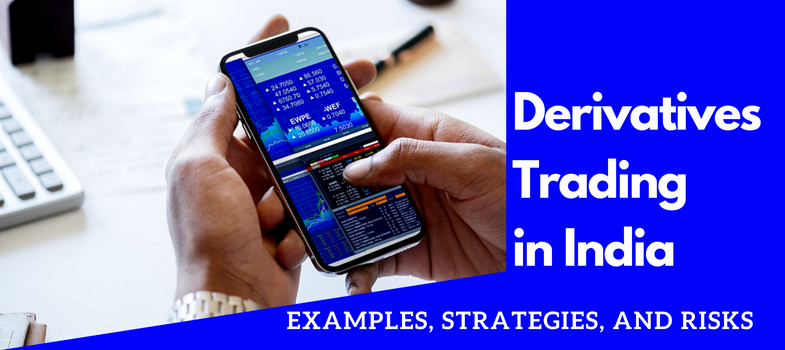You can do derivatives trading in India through National stocks Exchange (the NSE), Bombay Stocks Exchange (the BSE) in stocks. Similarly, if your interest is to trade in commodities, MCX and NCDEX are there. The MCX stands for the Multi Commodity Exchange. While NCDEX stands for the National Commodity and Derivatives Exchange. However, if you are willing to trade in currency, you can do it over NSE-SX, MCX-SX. If your interest is to trade in bonds again it’s also possible through NSE platform.
In derivatives trading, you are eligible to trade in derivatives instruments through the above-mentioned platforms. The most common type of derivatives that you can trade in India is future and options or f&o in short. Further, the important underlying markets for stocks, commodities, treasury bills, foreign exchange and real estate.
Before proceeding further let us understand the risks involved in derivatives trading in India.
The risk associated with derivatives trading in India
You should understand that derivatives trading carries an element of risk in it. The following points are self-explanatory.
- Derivatives product requires a large number of funds. So it is not for you if you have limited resources. Limited resources mean limited funds and low-risk appetite.
- Trading derivatives need expert knowledge. A high trading expertise and experience is mandatory with high-risk tolerance.
- As a derivatives trader, you must therefore carefully consider its suitability depending upon your financial position.
- You should accept the fact that you can lose profits. Even you can incur the loss with the execution of derivatives trade.
- It is invariably desirable to refer carefully Model Risk Disclosure Document before beginning the derivative trade. You can ask for this document from your broker. Also, before signing it you should read and understand its implications. This document clearly mentions all risk associated with derivatives trading.
- Read the sample SEBI Model Risk Document and also the same document for NSE derivatives trading for having an understanding of risk.
An understanding of derivatives trading risk with examples
Situation 1 – Derivatives trading risk with the future index
Suppose you purchased 100 Nifty 50 futures @ Rs. 10724 on May 10. The expiry date is May 28. Your total Investment was INR 10,72,400. You paid the initial margin of INR 1,07,240. On May 28, Nifty 50 index future closes at 10678.
Your loss is (1072400 – 1067800) X 100 = INR 4,60,000. In this situation your entire initial investment (i.e. INR 1,07,240) is lost. Additionally you need to pay INR 3,52,760 (4,60,000 – 1,07,240).
Situation 2 – Derivatives trading risk with stocks future
Now suppose you purchased 100 TCS futures @ INR 1740 on May 15. The expiry date is May 28. Your total Investment is INR 1,74,000. You paid an initial margin of INR 17,400. On May 28, the price per shares of TCS was INR 1800.
You gain (1800 – 1740) X 100 = INR 6000.
Situation 3 – Derivatives trading risk with index options
Suppose you buy 100 Nifty 50 call options at a strike price of INR 10,7000 on May 10. Nifty 50 index was at 10724. Suppose you paid the premium of INR 10,000 (@INR 100 per call X 100 calls). The expiry date of the contract is May 28. On May 28, the Nifty index closes at 10678. The call expires worthless.
You possess the entire INR 10,000 paid as premium.
Situation 4 – Derivatives trading risk with stocks option
Let us not assume that you buy 100 TCS put options at a strike price of INR 1750 on May 10. TCS share price is at 1740. You paid the premium of INR 5,000 (@ INR 50 per put X 100 calls). The expiry date of the contract is May 2018. On May 28, TCS shares close at INR 1800. In this case, the put option will expire worthlessly.
You will lose the entire INR 5,000 paid as premium.
How future contracts improved derivatives trading in India?
Future contracts are similar to the forward contracts with some improvements. Forward contract derives the values from the underlying spot prices. Under these contracts, two parties enter into an agreement to trade at some point in future. They agree to trade at pre-specified price and time. Also, there is no exchange of money during the time of entering the agreement. Future and forward contracts are derivatives market instruments in India.
However, trading with the forward contracts have deep limitations like –
- There is lack of any centralized trading mechanism,
- No predefined settlement procedure,
- Liquidity was always a concern, and
- Counterparty risk is always there.
Future contracts, however, overcome all these forward contract limitations. All future contracts are standardized. Trading in the future contract is centralized. Stocks exchanges facilitate centralized trading mechanism in this derivatives instrument. Further, there is no counterparty risk involved with future contracts. There is always clearing corporations behind every side of a transaction.
At present, there are five clearing corporations operational in India, namely –
- India International Clearing Corporation (IFSC) Limited
- Indian Clearing Corporation Ltd
- Metropolitan Clearing Corporation of India Ltd
- National Securities Clearing Corporation Ltd
- NSE IFSC Clearing Corporation Limited
The other features that differentiate future from the forward contracts are –
- The increased time to expiration does not increase the counterparty risk in future contracts, and
- Future contract markets are highly liquid in comparison to forward markets.
There are various participants in the derivatives trading in India. Learn about the derivatives market participants such as hedgers, arbitrageurs, and speculators in the blog.
Indian derivatives trading instruments and its type
In order to understand instruments for the derivatives market, let us concentrate over NSE platform. Mainly two types of derivatives instruments, namely futures and options.
All future contracts have cash settlement over NSE. Any future contract is always made between two persons. But clear corporation always takes opposite position against any order. Thus, there is always an opposite party by default in each trade. Unlike forward contracts, in future contract money transfer takes place during the time of entering the contract.
Similarly, while entering an option contract, the buyer of an option pays the premium. With this payment, the buyer gets the right to exercise his option to buy at the expiration date. On the other hand, the seller of options receives the premium. Due to this he/she is obliged to sell/buy the asset in the situation when buyer exercises his right.
In general, options are of two types. call options and put options. All options at NSE also settle at cash. When you buy a call option, you receive the right but not obligation to buy the asset at predefined price and quantity at or on the future date. On the other hand, if you buy put options you get the right but not obligation to sell the asset at predefined price and quantity at or on the future date.
Similarly, you can also write options. When you sell a call or put options we call it as writing options. One thing you must remember that while writing an option you receive the premium and when you buy options you will need to pay the premium. Get yourself acquainted with equity derivatives trading strategies for NSE with Rmoney India market intelligence.
Products of derivatives instruments at NSE
NSE has various derivatives product for the underlying stocks. You can trade on the future and options of both indices and single stocks. You can trade in Nifty 50 future, CNX IT Index, Bank Nifty index, CNX Nifty Junior Index, and Nifty Midcap 50 index.
But you can trade only on long-dated options contract on Nifty 50. You can also have the option to trade in some features of individual stocks and their options. Regarding options, you must remember, that all options on individual stocks are American type of options. While all index-based options are European options. Under American option, you can exercise your right any time up to the expiration date. While under European option you can exercise your right only on the expiration date.
You can learn more about types of derivatives trading in India on one of my blog. In this blog, you will not only know the various types of derivatives instruments will come to know various sources where you can look for information on derivatives trading in India.
About Author

Stock Trading Now trade in ₹9 Per Order or ₹ 999 Per Month Plans.
Future & Options Access F&O contracts with advanced tools for hedging and speculation.
Currency Trading Trade in major currency pairs and manage forex exposure efficiently.
Commodity Trading Diversify Trading with MCX & NCDEX by Trading in Gold, Silver, Base Metals, Energy, and Agri Products.
Margin Trading Funding Boost your buying power with upto 5X, Buy now Pay Later
Algo Trading Back test, Paper Trade your logic & Automate your strategies with low-latency APIs.
Trading View Leverage Trading View charts and indicators integrated into your trading platform.
Advanced Options Trading Execute multi-leg option strategies with precision and insights.
Stock Lending & Borrowing Earn passive income by lending stocks securely through SLB.
Foreign Portfolio Investment Enable NRIs and FPIs to invest in Indian markets with ease and compliance.
IPO Invest in upcoming IPOs online with real-time tracking and instant allotment updates.
Direct Mutual Funds 0% Commissions by investing in more than +3500 Direct Mutual Fund Scheme.
Corporate FDRs Earn fixed returns with low-risk investments in high-rated corporate fixed deposits.
Stocks SIPs Build long-term wealth with systematic investment plans in top-performing stocks.
Bonds & NCDs Access secure, fixed-income investments through government and corporate bond offerings.
Depository Services Safely hold and manage your securities with seamless Demat and DP services with CDSL.
Insurance One-Stop Destination For All Your Insurance Needs. Compare Quotes from Top Insurers & save bigs.
Journey Tracing our growth and milestones over time.
Mission & Vision Guided by purpose, driven by long-term vision.
Why RMoney Platform Smart, reliable platform for all investors' needs.
Management Experienced leadership driving strategic financial excellence.
Credentials Certified expertise with trusted industry recognition.
Press Release Latest company news, updates, and announcements.
Testimonials Real client stories sharing their success journeys.
7 Reasons to Invest Top benefits that make investing with us smart.
SEBI Registered Research Trusted insights backed by SEBI-compliant research.
Our Technology Advanced tools enabling efficient online trading.
Calculators Access a suite of smart tools to plan trades, margins, and returns effectively.
Margin Calculator Instantly check margin requirements for intraday and delivery trades.
MTF Calculator Calculate MTF funding cost upfront to ensure full transparency before placing a trade.
Brokerage Calculator Know your exact brokerage charges before placing any trade.
Market Place Explore curated investment products and trading tools in one convenient hub.
RMoney Gyan Enhance your market knowledge with expert blogs, videos, and tutorials.
Performance Tracker Track our research performance with full transparency using our performance tracker.
Feedback Share your suggestions or concerns to help us improve your experience.
Downloads Access important forms, software, and documents in one place.
Locate Us Find the nearest RMoney branch or service center quickly.
Escalation Matrix Resolve issues faster with our structured support escalation process.
Back Office Log in to view trade reports, ledger, and portfolio statements anytime.
Account Modification Update personal or bank details linked to your trading account.
Fund Transfer Transfer funds instantly online with quick limit updation to your trading account.
Bank Details View our registered bank account details for seamless transactions by NEFT, RTGS or IMPS.
How to Apply IPO Step-by-step guide to apply for IPOs using your trading account.
RMoney Quick Mobile App Trade on-the-go with our all-in-one mobile trading app.
RMoney Quick login Quickly access your trading account through the RMoney Quick web-based trading.
RMoney Rocket Web Version Experience powerful web-based trading with advanced tools for algo traders.
RMoney Rocket Mobile Version Trade anytime, anywhere with our feature-rich mobile trading platform.




















